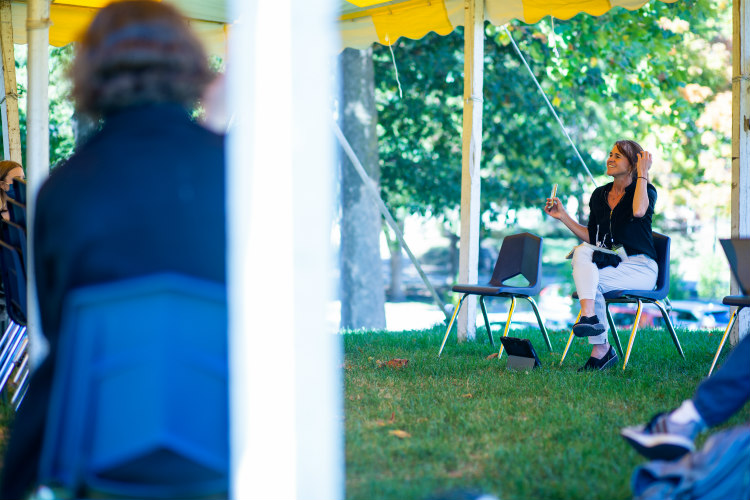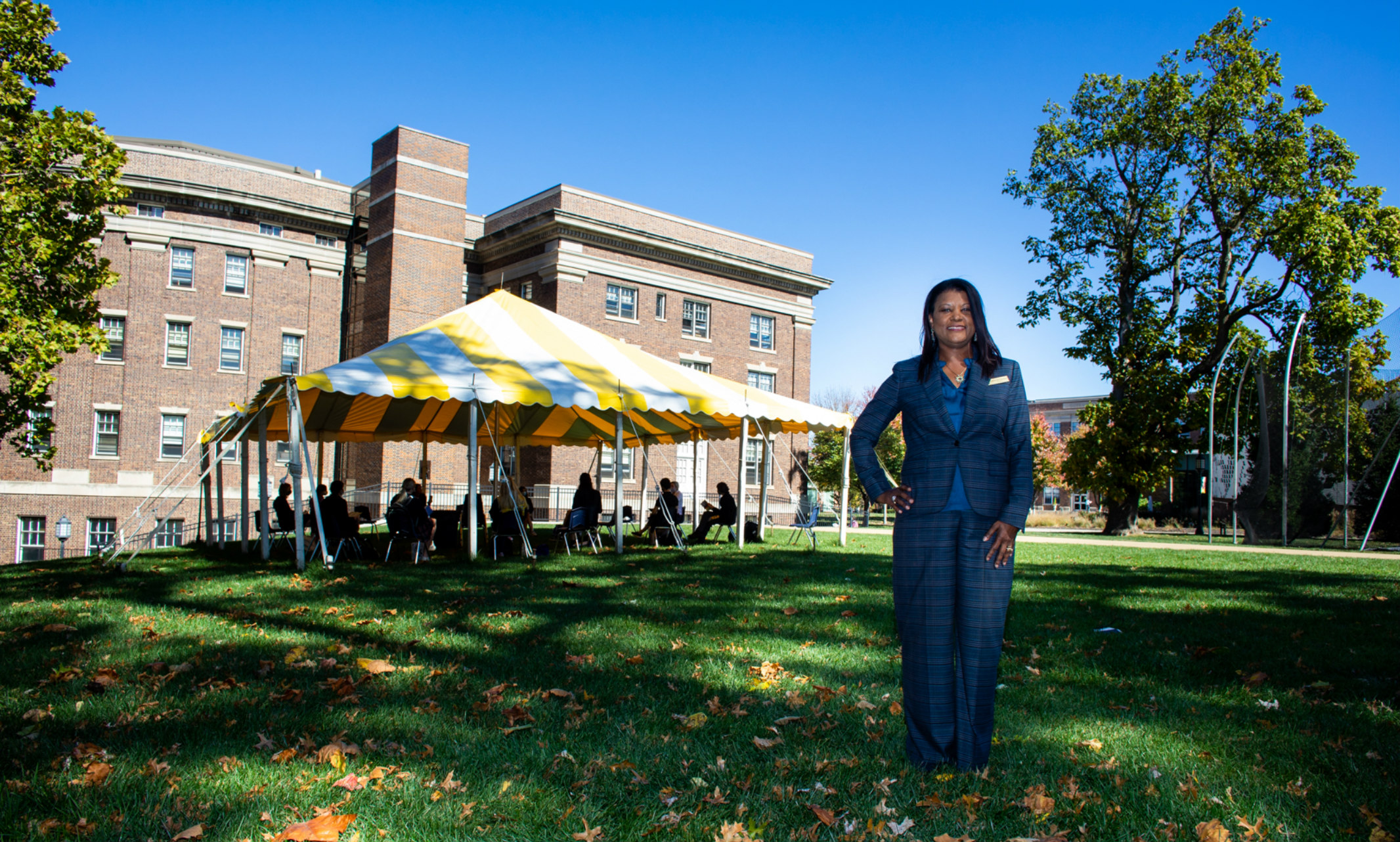People point to St. Teresa’s Academy President Siabhan May-Washington, Ed.D. as a model of school leadership during the pandemic.
May-Washington, B.A. English '88 and M.A. Curriculum and Instruction '91, admits COVID-19 caught her completely by surprise. As students and teachers were preparing for spring break, she was approached by a board member about her plans for the new novel coronavirus.
“I had read about the virus and I let him know that we would make plans to ramp up sanitation. He said, ‘I hate to scare you, but you need to be doing more than that.’ It heightened my sense of urgency. Then the very next day, hundreds of universities were sending students home, including my own children at college.”
May-Washington immediately convened her administrative team, that includes academic principal Barbara McCormick and principal for student affairs, Liz Baker, Ed.D, to develop a plan to ensure that teachers and students took everything they would need at home – including their computers – so they could continue their work once the break was over.
“That was a first foray into the pandemic,” she says. “We did not go back on campus after spring break until this fall.”
“Some districts were posting assignments for the week with no human contact. We knew that wasn’t going to work for us.”
May-Washington was fortunate that she had already established systems for remote learning.
“We had developed a system for students to work remotely during snow days, so they were accustomed to the virtual format. Not that they were thrilled about it,” she says with a laugh. “But they were used to that form of learning.”
This real-time online instruction worked well for students and teachers last spring. At the same time, May-Washington was gathering information about how other schools were handling the shutdown.
“Some districts were posting assignments for the week with no human contact. We knew that wasn’t going to work for us,” she says. “As we approached fall, we knew that to be successful we would need to maintain close contact with our students, not only in class, but also through their group advisory meetings, prayer check-ins and lunch buddy sessions.”
May-Washington relied heavily on her administrative team to develop fall programming.
“I formed the President’s Visionary Council Team when I started at St. Teresa’s last year. That team is made up of all the directors – development and marketing, college counseling, facilities and development and marketing.”
The Visionary Council morphed into the COVID-19 task force. In addition to their input, Jo Weller, B.S. Math ‘93, M.A. Curriculum and Instruction ‘95, who was director of curriculum and instruction, surveyed the students, teachers and parents about their thoughts and concerns.
“We determined that learning entirely online did not work well. So, we began to develop a very detailed, robust plan to reopen in the fall,” May-Washington said. “But while I had a cabinet full of research, we realized we needed additional support.”
May-Washington contracted with MRI Global, who reviewed their reopening plan and helped the school come up with thresholds and develop alternatives to exclusive online learning.
“They talked to our leadership team, but also our parent community and the facilities staff to educate our complete community about the severity of the virus and the steps that we needed to take to have safe learning on campus.”
In addition to putting safety measures in place, such as daily health check-ins, social distancing in classrooms and one-way traffic directions, May-Washington had large tents erected on campus.
“This gives us the option to have our kids outside learning on campus as much as we can,” she says. “We use them for lunch, the girls’ advisory group meetings and the teachers have the option to hold classes outside.”

While May-Washington could have worked solely with the board of directors to develop a plan, she thinks that letting people have input and involving MRI Global created an environment of collective ownership.
“I think it’s important to bring all the stakeholders who are part of the community to weigh in, especially if they are going to be in the trenches. Our teachers were very concerned about mask-wearing policy, physical distancing in the classrooms and what the consequences would be if they were not followed.”
Young adults are one of the most challenging demographics when it comes to following preventative guidelines in mitigating the virus. May-Washington says it was critical to let people express their emotions around this during the planning. Their gating guidelines are very conservative and the school did move to hybrid shortly after the semester began.
“After the first week of school, we had eight students test positive for the virus,” she says. “While they did not contract the virus at school and had followed all of our safety guidelines, we thought it would be a good time to shift to hybrid to practice the hybrid schedule, but also for peace of mind for our community.”
After that week of hybrid learning, students have been on campus full time since. While classes are going smoothly, May-Washington recognizes that students are under increased pressure. St. Teresa’s has had counseling services in place, both for personal and academic concerns. In addition, May-Washington contracted with Sources of Strength, a national program to bring students together to talk about emotional health and as a resource in suicide prevention.
“In addition to the counselors and this program, our students’ advisory groups are like a homeroom family. They have lunch together and meet every day. It’s a tremendous support system. And, of course, being a Catholic school, we have a campus ministry department that is very involved.”
“I like having my hands on all areas and helping to use my experience and expertise from the classroom for the greater good of the community.”
While May-Washington has responsibilities relating to the health of the entire school community, she is also working to balance her own personal responsibilities. She and her husband, Rick Washington, who is a teacher at Allen Village Charter, are juggling their jobs as well household responsibilities and the care of their three children.
“He’s a great partner,” she says. “Two of our children are in college, but our youngest is in fifth grade. He’s very involved, which is great when I’m at meetings late in the evening.”
This teamwork is critical as May-Washington’s dedication extends beyond St. Teresa’s to the larger Kansas City community. She served on a panel with area public school leaders and is sharing ideas with her fellow area private school administrators at a weekly online meeting.
May-Washington started her career as an English teacher and did not foresee moving into administration, but she finds she enjoys responsibilities beyond the classroom.
“I like having my hands on all areas and helping to use my experience and expertise from the classroom for the greater good of the community. I didn’t envision doing this type of work, but t’s been a great evolution.”

